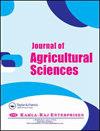不同来源产细菌肠球菌对单核增生李斯特菌的抑菌作用
IF 0.7
Q3 AGRICULTURE, MULTIDISCIPLINARY
引用次数: 2
摘要
本研究采用圆盘扩散法研究了不同来源肠球菌分离物部分纯化肠球菌素和粗细菌素对单核增生李斯特菌的抑菌活性。从食物和临床来源分离的肠球菌(粪肠球菌和屎肠球菌)中,有70%被发现为潜在的产菌菌株。食物和临床分离的肠球菌也表现出对单核增生乳杆菌的抗菌特性。此外,本研究检测到抑制活性是菌株特异性的。从粪肠杆菌分离得到的粗细菌素和部分纯化肠球菌素对单核增生乳杆菌的抑菌活性均低于分离得到的粪肠杆菌。粗肠球菌素和部分纯化肠球菌素获得的抑制直径分别为12.33 ~ 13.25 mm和8.66 ~ 9.25 mm。除120℃外,粗细菌素在热处理后仍保持抑菌活性,在pH值3 ~ 11范围内也保持抑菌活性。因此,肠球菌素在加热食品和酸性或碱性食品中可作为生物防腐剂。本文章由计算机程序翻译,如有差异,请以英文原文为准。
Antibacterial Effect of Bacteriocinogenic Enterococci from Different Sources on Listeria monocytogenes
In this study, antimicrobial activity of partially purified enterocins and crude bacteriocins from Enterococcus isolates with different sources was investigated against Listeria monocytogenes by disk diffusion assay. Totally 70% of enterococcal isolates (Enterococcus faecalis and Enterococcus faecium from food and clinical sources) were found as potential bacteriocinogenic strains. Both of food and clinical enterococcal isolates also exhibited antimicrobial properties against L. monocytogenes. Additionally, the present study detected that inhibitory activity was strain-specific. Both crude bacteriocins and partially purified enterocins from E. faecium isolates showed lower antimicrobial activity against L. monocytogenes than E.faecalis isolates. The inhibition diameters obtained withcrude enterocins and partially purified enterocins were respectively ranging from 12.33 mm to 13.25 mm and from 8.66 mm to 9.25 mm. Crude bacteriocins retained antibacterial activity after heat treatment except 120 o C and also remained functional at pH values between 3 and 11. Asa result, it was considered that enterocins could be benefit in heated and acidic or basic food products as biopreservative.
求助全文
通过发布文献求助,成功后即可免费获取论文全文。
去求助
来源期刊

Journal of Agricultural Sciences
AGRICULTURE, MULTIDISCIPLINARY-
CiteScore
1.80
自引率
0.00%
发文量
0
 求助内容:
求助内容: 应助结果提醒方式:
应助结果提醒方式:


